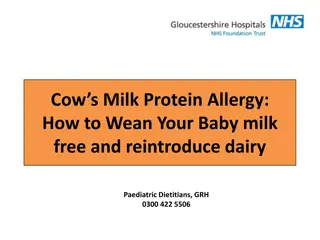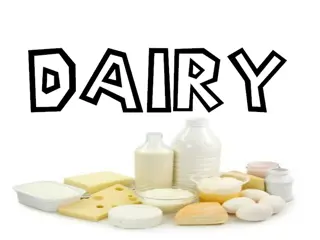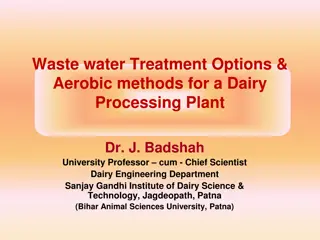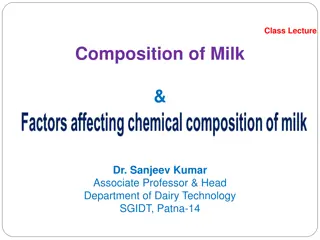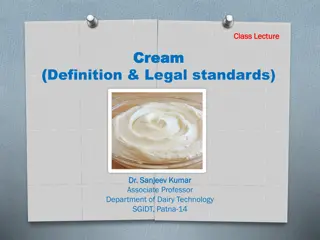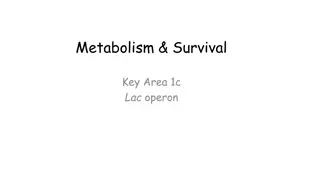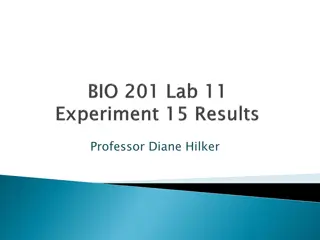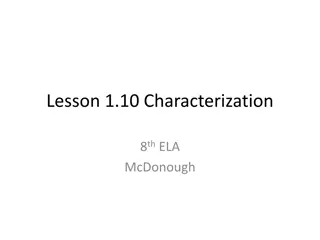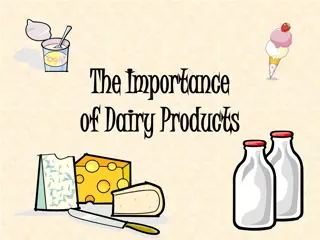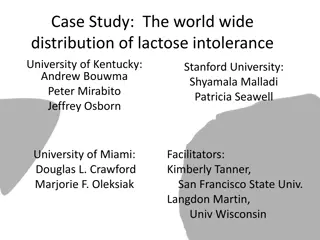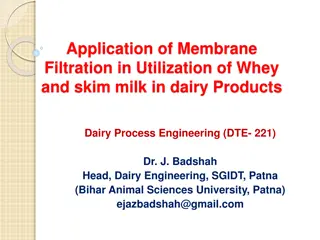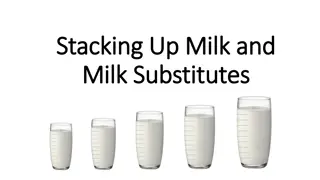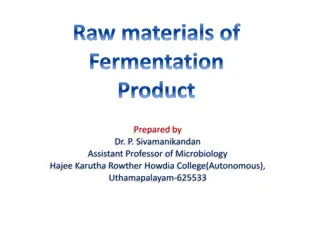Inflammation and Cholesterol Predicting Cardiovascular Events
This study explores how inflammation and cholesterol levels predict cardiovascular events among 13,970 statin-intolerant patients in the CLEAR Outcomes trial. Findings suggest residual inflammatory risk may be a stronger predictor than residual cholesterol risk for future events. The research analyz
0 views • 17 slides
Managing Cows Milk Protein Allergy (CMPA) in Infants: Weaning and Reintroduction Guidelines
Cows Milk Protein Allergy (CMPA) in infants can present various symptoms and challenges. This guide covers the diagnosis, symptoms, weaning strategies, reintroduction of dairy, alternative products, and meeting nutritional needs. Learn to differentiate between CMPA and lactose intolerance for proper
1 views • 31 slides
Insights into Milk Composition and Processing
Worldwide, milk is collected from various animals such as cows, goats, sheep, yaks, and water buffalo. The composition of milk includes water, lactose, butterfat, protein, and minerals, each playing a vital role in its nutritional value. The butterfat content determines the richness of dairy product
7 views • 41 slides
CLEAR Outcomes Trial: Bempedoic Acid for Cardiovascular Prevention
The CLEAR Outcomes Trial investigated the effects of bempedoic acid, an ATP citrate lyase inhibitor, on cardiovascular outcomes in primary prevention patients. Results showed a reduction in cardiovascular events with bempedoic acid, particularly in patients intolerant to statins. Baseline characteri
0 views • 13 slides
Waste Water Treatment Options for Dairy Processing Plants
Factors influencing waste water treatment options for a dairy processing plant include volume and flow rates, chemical characteristics, biodegradability, controlling levels of suspended solids, BOD, and COD in discharged water. Dairy wastes have high BOD due to lactose, fats, proteins, nitrogen, and
0 views • 17 slides
Understanding the Composition of Milk by Dr. Sanjeev Kumar
Milk, a vital substance for mammalian offspring, is a complex fluid composed of water, fat, protein, lactose, minerals, vitamins, and enzymes. Dr. Sanjeev Kumar, an Associate Professor and Head of the Department of Dairy Technology at SGIDT, enlightens us on the various constituents of milk, market
0 views • 11 slides
Pharmacological Management of Alzheimer's Disease and Cognitive Enhancers
Cognitive enhancers play a crucial role in managing Alzheimer's Disease, with Cholinesterase inhibitors (AChEI) like Donepezil, Galantamine, and Rivastigmine recommended for mild to moderate AD, and Memantine for moderate to severe cases. These medications act through different mechanisms, with AChE
0 views • 46 slides
Understanding Sucrose Hydrolysis and Reducing Sugars in Carbohydrate Chemistry
This content delves into the mechanisms of sucrose hydrolysis through non-enzymatic and enzymatic processes, highlighting disaccharides like sucrose, lactose, and maltose. It explores the significance of glycosidic bonds in carbohydrate structures and discusses the reducing capacity of sugars such a
7 views • 16 slides
Understanding Cream: Definition, Classification, and Composition
Cream, a dairy product rich in fat, plays a significant role in various food preparations. Defined by FSSAI, cream is classified based on fat content and end-use into market or manufacturing cream. Its composition includes water, fat, protein, lactose, ash, total solids, and solids-not-fat. Cream ty
0 views • 7 slides
Understanding Cream: Definition, Classification, and Composition
Cream, a dairy product rich in fat, is defined by FSSAI standards as milk fat obtained from buffalo milk. It is classified based on fat content and usage. Cream can be used for direct consumption or manufacturing dairy products. Different types of cream include light cream, coffee cream, whipped cre
1 views • 7 slides
Understanding the lac Operon and Gene Induction in E. coli
Explore the mechanism of gene induction through the lac operon in Escherichia coli, where genes are switched on or off based on the presence of lactose. Learn how enzymes like β-galactosidase are produced only when needed, following the Jacob-Monod hypothesis. This system allows for efficient resou
3 views • 16 slides
Understanding Lactose Intolerance and Nutritional Adaptation
Lactose intolerance is the inability to digest lactose in milk. This condition is prevalent among adults due to decreased lactase production. Symptoms include bloating, cramping, gas, diarrhea, nausea, and vomiting. Learn how lactose intolerance is a natural human adaptation and discover the geograp
0 views • 22 slides
Understanding Carbohydrates: Composition, Structure, and Function
Carbohydrates are composed of carbon, hydrogen, and oxygen in a specific ratio. Monosaccharides such as glucose, fructose, and galactose are carbohydrate monomers, while polysaccharides like lactose, sucrose, starch, cellulose, and glycogen are carbohydrate polymers. The chemical formula for glucose
0 views • 8 slides
Microbiology Laboratory Experiments Overview
This overview showcases various microbiology laboratory experiments conducted to examine the physiology of bacteria, enzymatic activities, and biochemical reactions. It includes experiments on Phenol Red Dextrose Broth, Phenol Red Lactose Broth, Nitrate Broth, Tryptone Broth, and more. The provided
0 views • 26 slides
Gir Cow Ghee Nature’s Purest Offering at Goseva
A2 ghee comes from the milk of cows that produce only the A2 protein, as opposed to A1, which is common in many dairy products. A2 protein is easier to digest, making this ghee suitable even for those with mild lactose intolerance. The natural struct
0 views • 4 slides
Understanding Characterization in Literature
Exploring the concept of characterization through the lens of Squeaky, a dynamic character from 8th grade ELA material. Analyzing direct and indirect characterization techniques and providing text evidence to support the characterization of Squeaky as a passionate, competitive, and intolerant charac
0 views • 23 slides
The Importance of Dairy Products for Your Health
Dairy products are essential for providing nutrients like calcium, vitamin D, and protein. They help in bone and muscle health, blood clotting, and nerve function. If you are lactose intolerant, there are alternative sources to get calcium. Meeting the recommended daily allowance of calcium is cruci
0 views • 11 slides
Understanding LacZ - Galactosidase Enzyme: Structure, Function, and Applications
LacZ - galactosidase enzyme, encoded by the lacZ gene in the lac operon, plays a crucial role in cleaving lactose, transgalactosylation, and regulating gene expression. Its application in labs using X-gal as a substrate allows for easy detection of active enzyme through color changes. This versatile
0 views • 13 slides
Understanding Genetic Mechanisms and Lactose Intolerance Distribution
Explore the genetic foundations of lactose intolerance through a comprehensive study on gene concepts, transcription and translation mechanisms, regulation processes, and phenotypic outcomes. Engage with learning goals focused on genotype-phenotype relationships, scientific processes, and the unique
0 views • 15 slides
Membrane Filtration in Dairy Products: Utilization of Whey and Skim Milk
Utilizing membrane filtration in dairy processing transforms whey, a byproduct of cheese production, into valuable products like refined proteins. Ultrafiltration (UF) allows for the fractionation of whey into protein-rich and lactose-containing streams, increasing protein content significantly. The
0 views • 11 slides
Comparing Milk and Milk Substitutes for Lactose Intolerant and Allergies
Explore the nutritional content of various milk and milk substitutes like soy, almond, rice, and coconut. Discover differences in fat, carbohydrates, protein, calcium, vitamins, and minerals. Learn which options to avoid based on lactose intolerance, soy allergy, and nut allergy.
0 views • 9 slides
Raw Materials in Industrial Fermentation Processes
Microorganisms utilized in industrial fermentation require essential raw materials such as water, energy sources, carbon, nitrogen, mineral elements, and sometimes vitamins and oxygen. Various raw materials like cane molasses, beet molasses, cereal grains, starch, glucose, and lactose serve as carbo
0 views • 15 slides

